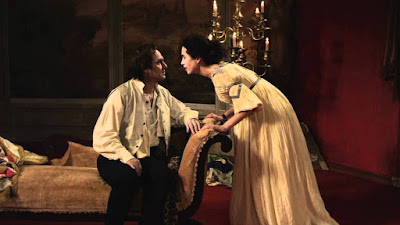The Museum of Contemporary Art has begun showing films curated by staff and guests. In August it screened a season of four films by Korean master Hong Sang-soo. It has to be asked who knew about this work. Maybe the MCA audience and aging cinephiles don't have a lot of overlap. Whatever, next up is a selection of new Portuguese cinema curated by Adrian Martin. Adrian has sent me a set of the notes supplied to the MCA and they are reproduced below. The screenings take place over the next four Saturdays beginning at 2.00 p.m. ...at least that was how they started advertising it but 'today's screening is now on tomorrow Sunday 4th at 2.00 pm. Not sure when that was changed nor whether I'll trek in there again.....
Utopian Fantasies
and Hard Realities: Four Glimpses of Contemporary Portuguese Cinema
Curation
and Notes: Adrian Martin
Portuguese
cinema is not terribly familiar within the art cinema and film festival
circuits of Australia. Perhaps some have heard mention of the Grand Master,
Manoel de Oliveira (1908-2015), or seen the sprawling narrative experiments of
Miguel Gomes. But there is much more to discover and savour amidst the
contemporary scene in Portugal: brilliant directors with a quarter-century of
work already behind them, such as Teresa Villaverde and Rita Azevedo Gomes, poetic
essay-documentarians such as Manuel Mozos, and newcomers hip to popular movie
genres, like João Nicolau. The tension that drives this national cinema in its
most creative forms is the pull between utopian fantasy – visions of a better
society, sometimes the escape into florid worlds of imagination allowed by
cinema itself – and a steely grasp on the current miseries of a world that is
reeling from every kind of blow, from economic scarcity to spiritual poverty.
Realism and lyricism, and all stops in between: this season offers four glimpses
into the richness of contemporary Portuguese feature production.
A Woman’s Revenge (2011)
Based on a
19th century tale by Jules Barbey d'Aurevilly (who Catherine
Breillat also adapted for her An Old
Mistress, 2007), A Woman’s Revenge
is an intense, superbly modulated exploration of gender roles, social status,
marital possessiveness and desire-driven retribution. The cinematic style of
Rita Azevedo Gomes, who has worked as a director since 1990, sits somewhere
between the hyper-theatricality of the Portuguese master Manoel de Oliveira and
the plangent pathos of Max Ophüls: there are stories within stories, stages
beyond stages, masks behind masks.
João Bénard da Costa - Others Will Love the
Things I Loved
(2014)
When
cinephiles and filmmakers evoke the greatest critics and theorists of cinema,
we most often hear the historic names of André Bazin, Manny Farber, Laura
Mulvey … but who is João Bénard da Costa (1935-2009)? In Portugal and in the international
circle of the most progressive film festivals and cinematheques, he is
legendary: nobody who ever heard this curator-supreme introduce one of his most
beloved movies ever forgot his erudite, inspiring, charismatic aura. This
imaginative, lyrical tribute by his colleague Manuel Mozos recreates that aura.
John From (2015)
João
Nicolau hails from the loose ‘school’ of filmmakers gathered around the most
internationally celebrated of the young Portuguese directors, Miguel Gomes (Tabu, Arabian Nights). This delightful, surrealistic teen comedy is high
on whimsy (the title is an incomplete statement of origin: ‘John from …’), full
of beguiling shifts in tone and mind-bending flights of fantasy. With an
amazing colour palette and pop song selection, its vision of a young girl’s
romantic obsession is utterly charming.
Cisne (2011)
Teresa
Villaverde, active since the early 1990s, is among the most important
contemporary filmmakers, but her work is still too little known outside
Portugal. Her films frequently circle bleak subjects: trauma, abuse,
kidnapping, sex trafficking. Above all, she probes the fraught network of the
modern family unit, seemingly the source of all horror and yet, at the same
time, one of the few hopes for any grace, connection or redemption. Cisne is a characteristically enigmatic,
elliptical, powerfully emotive testament.
Adrian Martin, an arts critic and audiovisual
artist based in Vilassar de Mar (Spain), is Adjunct Professor of Film and
Screen Studies at Monash University (Australia). He is the author of seven
books on cinema (the most recent being Mise
en scène and Film Style: From Classical Hollywood to New Media Art, from
Palgrave), and co-editor of LOLA journal online. In a former life, he
was a regular film critic for The Age
newspaper in Melbourne and Radio National’s long-lost The Week in Film.


No comments:
Post a Comment
Note: only a member of this blog may post a comment.